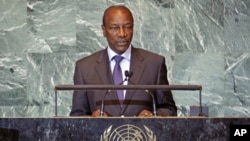Parliamentary elections were supposed to be held Thursday in Guinea, but deep-rooted ethnic and political misgivings caused them to be postponed indefinitely. One year into Alpha Condé's presidency, his government has made some progress in getting the people of Guinea to reconcile with each other and resolving the country's many humanitarian problems, but some aid workers say Condé can do better.
Guinea's first parliamentary elections in nearly 10 years were upended by ethnically-fueled political divisions. Those splits caused concern among opposition parties that say they were not adequately involved. Alhousseine Makanera is an advisor to Guinea's minister of territorial administration. He said that the government and the electoral commission took their concerns to heart and decided to delay the elections.
Makanera said the president did not want to exclude anyone from the legislative elections and he decided to engage the opposition in a political dialogue that would consider all positions and permit the elections to pass smoothly. He added that, if this is done, the parliament will reflect the wishes of the people of Guinea.
Checkered human rights record
A recent Human Rights Watch report on Guinea's humanitarian situation appraised Condé's first year in office, with mixed results. Corinne Dufka is the senior West African researcher for Human Rights Watch. She said that parliamentary elections tend to solidify presidential power, which would be very problematic in Guinea.
"I don't think people would argue with postponing somewhat an election if it will lead to much greater transparency. But the months and months that it's taken to organize this one is unacceptable because it has the effect of denying Guineans the right to elect their representatives," said Dufka.
Dufka said that Guinea is a very polarized country, where party lines usually fall on ethnic ones. Although he has created a reconciliation commission, Condé has exacerbated ethnic tensions by appointing members of his Malinké ethnic group to high-level civil service positions - including the military. That concerns members of the Peul ethnicity, who have been the primary victims of rampant police and military brutality. Mamadou Barry, who lives in Conakry, has a common opinion of the government among the Peul.
Barry said that the human rights situation in Guinea remains in shambles and that unless power changes hands, it can only worsen. He added that today, the security situation contributes to the misery and hunger of Guineans.
Positive assessment by Malinké side
That assessment contrasts starkly to the average Malinké situation. Saran Toure also is from Conakry.
Toure said that human rights are respected in Guinea because there is no more insecurity and Guineans can walk freely now. She said that since Condé has been in power, there are fewer problems
There seems to be some truth to that. Human Rights Watch's Dufka admits that some progress has been made, and that 50 years of authoritarian rule in Guinea is difficult for the first democratically-elected president to turn around.
"He [Condé] has acknowledged that the army is really a force to be reckoned with and that he can't move too swiftly on issues like discipline and accountability because they could possibly revolt against him," said Dufka.
An assassination attempt on Condé in July has been cited as a reason why he has tread lightly with the military, especially regarding the massacre of 150 and rape of 100 women at a political rally in 2009. Although Alpha Condé was not in power then, his neglect of that incident is a major opposition grievance.
Guinea's Humanitarian Problems Continue in Condé Era With Delayed Vote
- By Nick Loomis




